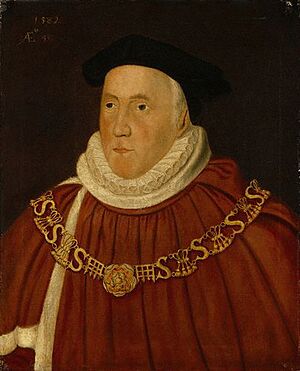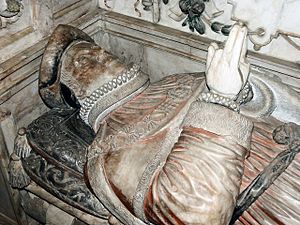Christopher Wray (English judge) facts for kids
Sir Christopher Wray (born 1524 – died 7 May 1592) was a famous English judge. He became the Chief Justice of the King's Bench, which was the highest judge in England at the time.
Contents
Early Life and Learning
Christopher Wray was born in 1524 in Bedale, Yorkshire. His father, Thomas Wray, managed the lands of Coverham Abbey in 1535.
Christopher went to Buckingham College in Cambridge. This college later became Magdalene College. Even though he might not have officially graduated, he loved his college and learning. He helped the college a lot. He built a part of the college with rooms for students and teachers. He also set up money to support more teachers and students.
In 1545, Christopher started studying law at Lincoln's Inn. He became a lawyer in 1550. He was chosen to be a "reader" (a senior lawyer who taught others) and later the "treasurer" (who managed the finances) of Lincoln's Inn. In 1567, he became a serjeant-at-law, which was a special rank for top lawyers. Soon after, he was made the Queen's Serjeant, working directly for the Queen.
Christopher Wray also served in the Parliament. He represented Boroughbridge, Yorkshire, from 1553 until Queen Mary died in 1558. Then, from 1563 to 1567, he represented Great Grimsby, Lincolnshire. At that time, people in the north of England often had Catholic beliefs. Christopher was careful about his religious views. In a survey of judges in 1564, he was described as "indifferent," meaning he didn't strongly show his religious side.
In 1569–70, he helped with trials in York, Carlisle, and Durham. These trials were for people who had rebelled in the north. His own brother and nephew were among those who were pardoned.
Speaker of the House of Commons
In 1571, Christopher Wray was chosen to be the Speaker of the House of Commons. He was representing Ludgershall, Wiltshire, at the time.
As Speaker, he gave a speech to the Queen. He talked about the Queen's power over the church. He also thanked her for allowing fair justice. He asked for certain rights for the members of Parliament, like freedom from arrest and the ability to speak freely. The Queen agreed to most of his requests. However, she told the members they should only discuss state matters that her ministers brought to them.
Despite this, Parliament started discussing religious reforms again. This led to the Parliament being closed down quickly. Christopher Wray also helped pass a law that protected the rights and freedoms of the University of Cambridge. The university thanked him for his help.
Becoming Lord Chief Justice
On 14 May 1572, Christopher Wray became a judge. Then, on 8 November 1574, he was appointed the Chief Justice of the Queen's Bench. This was a very important position.
As Chief Justice, he had many different duties. For example, in 1577, he was part of a group that decided if an election for a college leader at Lincoln College, Oxford was fair. He also advised the House of Lords on new laws and received requests from people.
He was known as a strong judge. He made sure his office was respected. He stopped the church court from overstepping its power in 1581. He also made sure laws against certain religious groups were followed. Later, in 1589, he joined the church commission himself.
Christopher Wray was present when Mary, Queen of Scots was tried in 1586. He was an advisor to the court but did not actively take part in the trial. He also oversaw the trial of William Davison, a secretary of state, in 1587. Davison was punished for being too eager in his duties. Wray said Davison's actions were "good but not well done" before giving the court's harsh sentence.
His last major trials were for Philip Howard, Earl of Arundel, in 1589, and Sir John Perrot in 1592. In 1590, he started a review of how peace commissions were set up, as they had many mistakes.
Later Life and Legacy
Sir Christopher Wray passed away on 7 May 1592. He was buried in the church of St Michael in Glentworth, Lincolnshire. He had built a grand house for himself in Glentworth. He also built a place for the poor and a sessions house (a building for court meetings) nearby.
He owned large estates in Yorkshire and Lincolnshire. His tomb in Glentworth church is a beautiful monument. People praised him for his deep legal knowledge, quick thinking, clear speaking, and great patience. Even though he was a fair judge, some of his decisions in cases involving the Crown, like the punishment of Edmund Campion and Davison, were seen as very strict.
Family Life
Sir Christopher Wray married Anne Girlington. They had one son and two daughters. His wife and children were known as important Puritan leaders. His son, Sir William Wray, was described as a main supporter of religious people in Lincolnshire.
- His older daughter, Isabel, married three times. Her last husband was John, Lord Darcy of Aston. She passed away in 1623.
- His younger daughter, Frances, married Sir George St Paul and later Robert Rich, 1st Earl of Warwick. She died around 1634.
- His son, Sir William Wray (1555–1617), became a baronet in 1611. He had two sons, Sir John Wray and Sir Christopher Wray (1601–1646), who also became important figures.
Arms
|
 | Janet Taylor Pickett |
 | Synthia Saint James |
 | Howardena Pindell |
 | Faith Ringgold |



